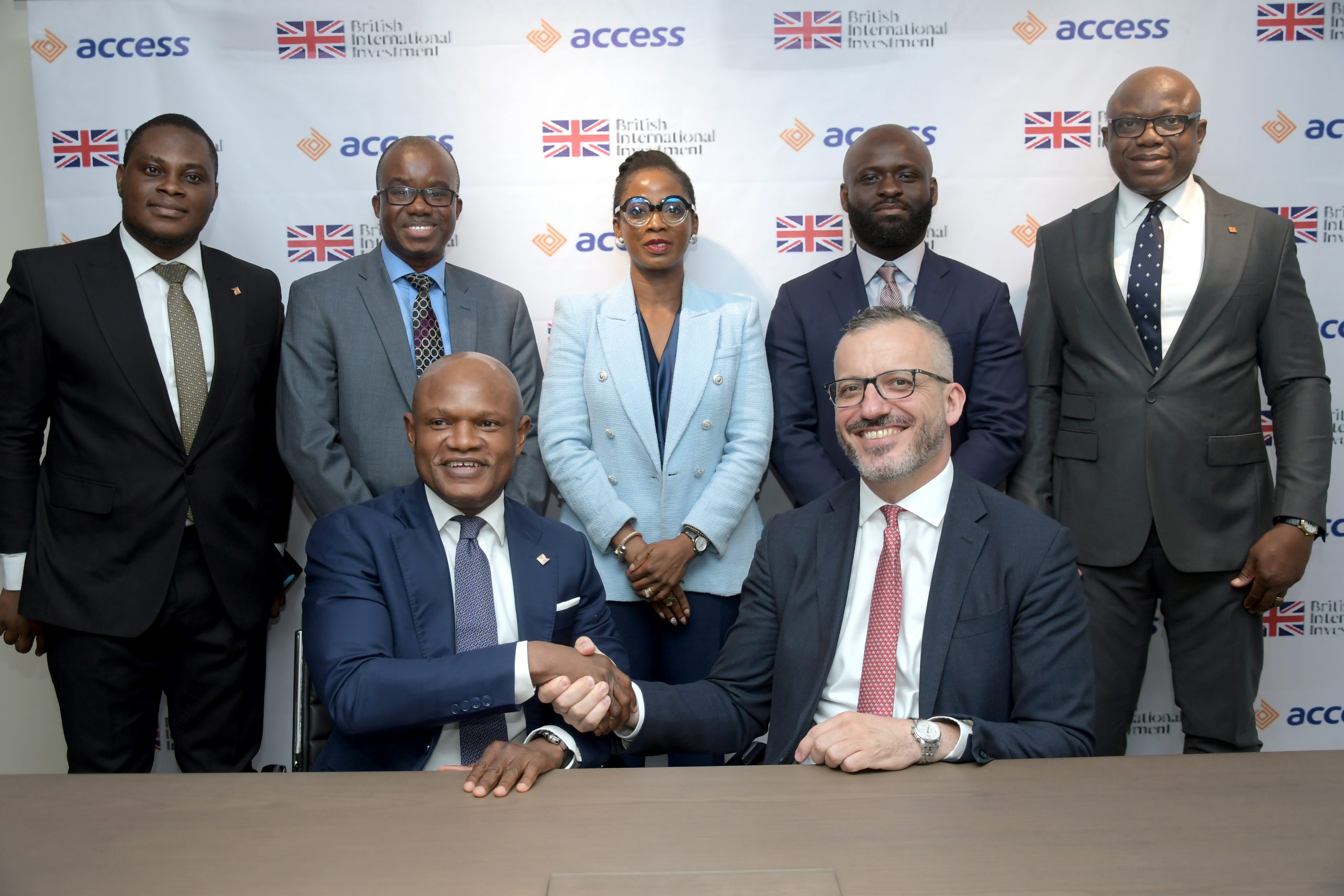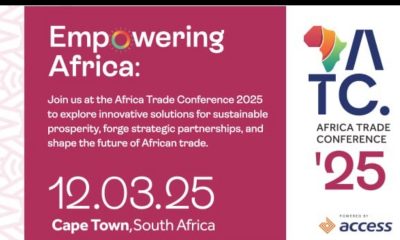Business
British International Investment partners with Access Bank Plc to extend US$60 million trade finance facility across five African countries

British International Investment partners with Access Bank Plc to extend US$60 million trade finance facility across five African countries
-
Loan facility will help to ensure the availability of key commodities across import-dependent economies and critical inputs for manufacturing goods, medicine, commodities, construction, food, and agriculture.
-
The programme aims to stimulate African trade volumes by US$90 million and will contribute to SDGs 8 and 9.
-
BII’s second commitment to one of Nigeria’s leading multinational banks.
British International Investment (BII), the UK’s Development Finance Institution (DFI) and impact investor has announced a $60 million trade finance facility for Access Bank Plc in Nigeria and five of its pan-African subsidiaries. This will strengthen import and export capabilities amongst local businesses and plug the foreign currency supply gap. The programme supports Access Bank’s strategy to enable continental trade and deepens BII’s commitment to bolstering financing environments in fragile economies. BII estimates the loan programme will stimulate African trade volumes by US$90 million.
The agreement reinforces BII’s ongoing relationship with Nigeria’s largest commercial bank by assets and facilitates the provision of systemic liquidity during a period characterised by a challenging macroeconomic environment. Higher inflation and rising cost of capital have placed downward pressure on currency performance, both domestically and in the programme’s target markets of the Democratic Republic of Congo, Mozambique, Rwanda, Sierra Leone, and Zambia. Intervention at this critical juncture underlines the key role of BII, and development finance institutions in general, in extending countercyclical support to build economic resilience.
Between 80% and 90% of world trade is estimated to rely on the availability of trade credit, according to the World Trade Organization. Prior to the COVID-19 pandemic, the financing gap stood at US$82 billion in Africa, and it is increasing. Recognising the positive ripple effects of robust trade flows on economies and livelihoods, Access Bank is aiming to provide 15% of trade finance across Africa, by growing the trade books of its subsidiaries.
Currency instability in Nigeria can hinder the wider proliferation of dollar denominated trade loans across African markets, constraining countries’ ability to capitalise on opportunities opening up under the African Continental Free Trade Agreement. By specifically targeting import dependent economies – many of which will mark the first engagement with BII’s Trade programme – the improved availability of US dollar denominated trade loans will ensure availability of key commodities and manufacturing inputs for the production and export of goods. The key outcome will be improving livelihoods and preserving jobs for the employees of importers and exporters with limited access to foreign exchange trade loans.
With the loans channelled into companies in construction, manufacturing and FMCG, the programme will directly contribute to the UN Sustainable Development Goals 8 (Decent work and economic growth) and 9 (Industry, innovation and infrastructure).
Simultaneously, the facility will improve inclusion. Qualifying under the 2X Challenge, aimed at strengthening female participation and leadership in business, Access Bank will ensure the allocation of loans is designed deliberately to advance its gender commitments. In addition, the facility will contribute to BII’s BOLD programme, dedicated to enhancing the availability of finance at more affordable rates to Black, African-owned businesses.
Seyi Kumapayi, Executive Director, African Subsidiaries at Access Bank, remarked: “Access Bank is on a purposeful mission to scale intra-African trade and position the continent as a viable market for global trade. Hence, we are thrilled about the tremendous potential that this trade finance facility with the BII affords us across our pan-African subsidiaries. This strategic collaboration not only strengthens our import and export capabilities but also expands our resources to support local industries – especially women-owned businesses – and ultimately drive economic growth. By stimulating trade volumes, we will be playing a key role in fostering long-term economic resilience for the continent, while increasing its attractiveness for increased foreign investments.”
Admir Imami, Director and Head of Trade and Supply Chain Finance at BII, noted: “Access Bank is a long-standing partner of BII’s and our new partnership is a significant step closer to narrowing the trade finance gap in Africa, particularly in countries such as the DRC and Rwanda.
Access to finance in fragile states is hugely constrained, often these countries are buffeted by macroeconomic events far beyond their control. BII and Access Bank share a conviction that building the resilience of these businesses by ensuring affordable access to foreign exchange is vital to keep intra-African trade moving and support the growth of inclusive economies.”
Benson Adenuga, Head of Office & Coverage Director for Nigeria, BII said: “Our latest commitment to Access Bank reiterates our assurance to this leading multinational institution and to Nigeria. It comes at a time when Nigeria’s fragile economic situation needs additional funding, particularly from counter cyclical investors like development finance institutions. Our funding will help bolster the economy and ensure the availability of staple goods, medicines and food across Africa.”
Bank
Alpha Morgan to Host 19th Economic Review Webinar

Alpha Morgan to Host 19th Economic Review Webinar
In an economy shaped by constant shifts, the edge often belongs to those with the right information.
On Wednesday, February 25, 2026, Alpha Morgan Bank will host the 19th edition of its Economic Review Webinar, a high-level thought leadership session designed to equip businesses, investors, and individuals with timely financial and economic insight.
The session, which will hold live on Zoom at 10:00am WAT and will feature economist Bismarck Rewane, who will examine the key signals influencing Nigeria’s economic direction in 2026, including policy trends, market movements, and global developments shaping the local landscape.
With a consistent track record of delivering clarity in uncertain times, the Alpha Morgan Economic Review continues to provide practical context for decision-making in a dynamic environment.
Registration for the 19th Alpha Morgan Economic Review is free and can be completed via https://bit.ly/registeramerseries19
It is a bi-monthly platform that is open to the public and is held virtually.
Visit www.alphamorganbank to know more.
Business
GTBank Launches Quick Airtime Loan at 2.95%

GTBank Launches Quick Airtime Loan at 2.95%
Guaranty Trust Bank Ltd (GTBank), the flagship banking franchise of GTCO Plc, Africa’s leading financial services group, today announced the launch of Quick Airtime Loan, an innovative digital solution that gives customers instant access to airtime when they run out of call credit and have limited funds in their bank accounts, ensuring customers can stay connected when it matters most.
In today’s always-on world, running out of airtime is more than a minor inconvenience. It can mean missed opportunities, disrupted plans, and lost connections, often at the very moment when funds are tight, and options are limited. Quick Airtime Loan was created to solve this problem, offering customers instant access to airtime on credit, directly from their bank. With Quick Airtime Loan, eligible GTBank customers can access from ₦100 and up to ₦10,000 by dialing *737*90#. Available across all major mobile networks in Nigeria, the service will soon expand to include data loans, further strengthening its proposition as a reliable on-demand platform.
For years, the airtime credit market has been dominated by Telcos, where charges for this service are at 15%. GTBank is now changing the narrative by offering a customer-centric, bank-led digital alternative priced at 2.95%. Built on transparency, convenience and affordability, Quick Airtime Loan has the potential to broaden access to airtime, deliver meaningful cost savings for millions of Nigerians, and redefine how financial services show up in everyday life, not just in banking moments.
Commenting on the product launch, Miriam Olusanya, Managing Director of Guaranty Trust Bank Ltd, said: “Quick Airtime Loan reflects GTBank’s continued focus on delivering digital solutions that are relevant, accessible, and built around real customer needs. The solution underscores the power of a connected financial ecosystem, combining GTBank’s digital reach and lending expertise with the capabilities of HabariPay to deliver a smooth, end-to-end experience. By leveraging unique strengths across the Group, we are able to accelerate innovation, strengthen execution, and deliver a more integrated customer experience across all our service channels.”
Importantly, Quick Airtime Loan highlights GTCO’s evolution as a fully diversified financial services group. Leveraging HabariPay’s Squad, the solution reinforces the Group’s ecosystem proposition by bringing together banking, payment technology, and digital channels to deliver intuitive, one-stop experiences for customers.
With this new product launch, Guaranty Trust Bank is extending its legacy of pioneering digital-first solutions that have redefined customer access to financial services across the industry, building on the proven strength of its widely adopted QuickCredit offering and the convenience of the Bank’s iconic *737# USSD Banking platform.
About Guaranty Trust Bank
Guaranty Trust Bank (GTBank) is the flagship banking franchise of GTCO Plc, a leading financial services group with a strong presence across Africa and the United Kingdom. The Bank is widely recognized for its leadership in digital banking, customer experience, and innovative financial solutions that deliver value to individuals, businesses, and communities.
About HabariPay
HabariPay is the payments fintech subsidiary of GTCO Plc, focused on enabling fast, secure, and accessible digital payments for individuals and businesses. By integrating payments and digital technology, HabariPay supports innovative services that make everyday financial interactions simpler and more seamless.
Enquiries:
GTCO
Group Corporate Communication
[email protected]
+234-1-2715227
www.gtcoplc.com
Business
BUA Group, AD Ports Group and MAIR Group Launch Strategic Plan for World-Class Sugar and Agro-Logistics Hub at Khalifa Port

BUA Group, AD Ports Group and MAIR Group Sign MoU to Explore Collaboration in Sugar Refining, Agro-Industrial Development, and Integrated Global Logistics Solutions
Abu Dhabi, UAE – Monday, 16th February 2026
BUA Group, AD Ports Group, and MAIR Group of Abu Dhabi today signed a strategic Memorandum of Understanding (MoU) to explore collaboration in sugar refining, agro-industrial development, and integrated global logistics solutions. The partnership aims to create a world-class platform that strengthens regional food security, supports industrial diversification, and reinforces Abu Dhabi’s position as a hub for trade and manufacturing.
The proposed collaboration will leverage BUA Group’s industrial and logistics expertise, Khalifa Port’s world-class infrastructure, and AD Ports Group’s operational experience. The initiative aligns with the objectives of the UAE Food Security Strategy 2051, which seeks to position the UAE as a global leader in sustainable food production and resilient supply chains. It also aligns with Nigeria’s food production- and export-oriented agricultural transformation agenda, focused on scaling domestic capacity, strengthening value addition, improving post-harvest logistics, and unlocking new markets for Nigerian produce across the Middle East, Asia, and beyond.

Photo Caption: L-R: Kabiru Rabiu, Group Executive Director, BUA Group; Cpt. Mohammed J. Al Shamisi, MD/Group CEO, AD Ports Group; Saif Al Mazrouei, CEO (Ports Cluster) AD Ports Group; Abdul Samad Rabiu, Founder/Executive Chairman, BUA Group; and Steve Green, Group CFO, MAIR Group
Through structured aggregation, processing, storage, and maritime export channels, the partnership is designed to reduce supply chain inefficiencies, enhance traceability and quality standards, and also create a predictable trade corridor between West Africa and the Gulf.
BUA Group—recognised as one of Africa’s largest and most diversified conglomerates, with major investments across sugar refining, food production, flour milling, cement manufacturing, and infrastructure- brings extensive industrial expertise and large-scale operational capability to the venture. MAIR Group will provide strategic support in developing integrated logistics and agro-industrial solutions, creating a seamless platform for production, storage, and distribution.
Abdul Samad Rabiu, Founder and Chairman of BUA Group, said:
“This MoU marks an important milestone in BUA’s international expansion and reflects our long-term vision of building globally competitive industrial platforms. Together with AD Ports Group and MAIR Group, we aim to develop sustainable food production and logistics solutions that strengthen regional supply chains and support the UAE’s Food Security Strategy 2051.”
He further added that, “This partnership represents not just a commercial arrangement but a strategic food corridor anchored on shared economic ambition, resilient infrastructure, and disciplined execution, reinforcing long-term food security objectives for both nations.”
A representative of MAIR Group added:
“This collaboration underscores our commitment to advancing strategic industries in Abu Dhabi and building integrated solutions that reinforce the UAE’s position as a global hub for trade, food security, and industrial excellence.”
A spokesperson from AD Ports Group commented:
“Our partnership with BUA Group and MAIR Group highlights Khalifa Port’s role as a catalyst for high-impact industrial investments. This initiative will enhance regional food security, strengthen global trade connectivity, and support Abu Dhabi’s economic diversification goals.”
This MoU marks a historic collaboration that combines world-class infrastructure, industrial expertise, and strategic vision, setting the stage for a sustainable and resilient food and logistics ecosystem that will benefit the UAE, the region, and global markets alike.
-

 celebrity radar - gossips6 months ago
celebrity radar - gossips6 months agoWhy Babangida’s Hilltop Home Became Nigeria’s Political “Mecca”
-

 society6 months ago
society6 months agoPower is a Loan, Not a Possession: The Sacred Duty of Planting People
-

 society5 months ago
society5 months agoReligion: Africa’s Oldest Weapon of Enslavement and the Forgotten Truth
-

 news6 months ago
news6 months agoTHE APPOINTMENT OF WASIU AYINDE BY THE FEDERAL GOVERNMENT AS AN AMBASSADOR SOUNDS EMBARRASSING









